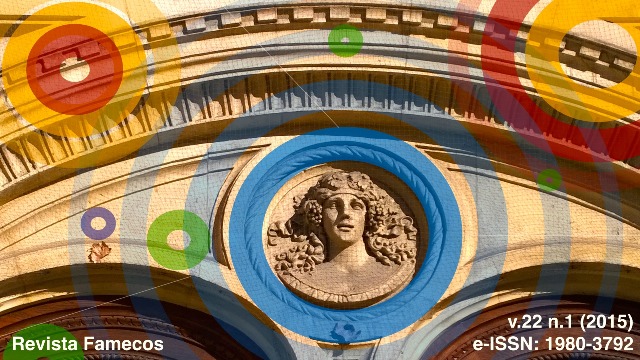As Utopias e a Guerra Comunicacional
DOI:
https://doi.org/10.15448/1980-3729.2015.1.19590Palavras-chave:
Utopia, Guerra Assimétrica, PercepçãoResumo
Este estudo faz uma análise da guerra comunicacional, a que ocorre nos enfrentamentos assimétricos tais como os realizados pelo Estado Islâmico. O principal objetivo deste tipo de embate não é vencer o inimigo, mas controlar a percepção do público. Estas ações militares visam principalmente dominar a agenda noticiosa. O ato terrorista e a violência indiscriminada são meios através do quais os grupos revolucionários atraem a atenção das redações e através delas exercem forte influencia sobre o clima de opinião pública. Faz-se aqui uma análise de 41 conflitos que estavam em andamento em 2013 motivados principalmente por utopias políticas e religiosas. Conclui-se que a utopia é um dos principais fatores que influenciam a ação dos militantes nestes confrontos.
Downloads
Referências
ARREGUÍN-TOFT, Ivan. How the weak win wars. International Security, v. 26, n. 1, p. 93-128, summer 2011.
DUNLAP, Charles J. Law and military interventions: preserving humanitarian values in 21st conflicts. Kennedy School of Government, Harvard University, 2001. Disponível em: http://people.duke.edu/~pfeaver/dunlap.pdf Acesso em: 5 jul. 2014.
ECHEVARRIA, J. A. Fourth Generation War and Other Myths. Strategic Studies Institute, 2005.
GOULDING Jr., Vincent J. Back to the Future with Asymmetric Warfare. Parameters, p. 21-30, Winter 2000-2001. Disponível em:
http://strategicstudiesinstitute.army.mil/pubs/parameters/Articles/00winter/goulding.htm Acesso em: 5 jul. 2014.
HAMMES, Thomas X. The Sling and the Stone: On War in the 21st Century. Zenith Press, 2004.
HEIDELBERG INSTITUTE FOR INTERNATIONAL CONFLICT RESEARCH. Conflict Barometer 2013. 2014. Disponível em: http://hiik.de/de/downloads/data/downloads_2013/ConflictBarometer2013.pdf Acesso em: 8 jul. 2014.
HOFFMAN, F. G. 4GW as a Model of Future Conflict. Boyd 2007 Conference. 13 de julho de 2007.
IMPERIAL AND ROYAL AUSTRO-HUNGARIAN MARINE CORPS. Fourth Generation War, 2008. Disponível em: http://www.dnipogo.org/fcs/pdf/fmfm_1-a.pdf Aceso em: 7 jul. 2014.
LEE, Min Goo. The just war tradition and utopian political thought. E-International Relations. 2014. Disponível em: http://www.e-ir.info/2014/07/11/the-just-war-tradition-and-utopian-political-thought Acesso em: 5 jul. 2014.
LIND, William; NIGHTENGALE Keith; SCHMITT, John F.; SUTTONE, Joseph W.; WILSON, Gary I. The Changing Face of War: Into the Fourth Generation. Marine Corps Gazette, Oct, 1989.
MACK, Andrew. Why big nations lose small wars: the politics of asymmetric conflict. World Politics, v. 27, n. 2, p. 175-200, 1975. Disponível em: http://web.stanford.edu/class/polisci211z/2.2/Mack%20WP%201975%20Asymm%20Conf.pdf Acesso em: 10 jul. 2014.
MANNHEIM, Karl. Ideology & utopia. Harvest, 1985.
MANDEL, Robert. Reassessing Victory in Warfare. Armed Forces & Society, v. 33, n. 4, p. 461-495, 2007.
MOYN, Samuel. The last utopia: human rights in history. The Belknap Press of Harvard University Press, 2010.
PETRAEUS, David H. Multi-National Force-Iraq Comdander’s Counteringsurgency Guindance. Military Review, Sept.-Oct., 2008.
Disponível em: http://usacac.army.mil/CAC2/MilitaryReview/Archives/English/
MilitaryReview_20081031_art004.pdf Acesso em: 14 jun. 2014.
RONFELDT, David et al. The Zapatist Social Netwar in Mexico. Rand’s Arroyo Center, 1998. Disponível em: http://www.rand.org/content/dam/rand/pubs/monograph_reports/1998/MR994.pdf Acesso em: 20 jun. 2014.
STEPANOVA, Ekaterina. Terrorism in Asymmetrical Conflict. Ideological and Structural Aspects. Stockholm International Peace Research Institute. Research Report n. 23. Oxford University Press, 2008.
WAINBERG, Jacques A. O discurso utópico e o poder persuasivo da violência. In: Revista Comunicação e Sociedade, São Bernardo do Campo, v. 35, n. 2, p. 71-91, jan./jun. 2014.
______. Revolucionários, mártires e terroristas: a utopia e suas consequências. Ed. Paulus, 2015, (no prelo).
WALZER, Michael. Just and Unjust Wars. Basic Books, 2007.
Downloads
Publicado
Como Citar
Edição
Seção
Licença
Direitos Autorais
A submissão de originais para a Revista Famecos implica na transferência, pelos autores, dos direitos de publicação. Os direitos autorais para os artigos publicados nesta revista são do autor, com direitos da revista sobre a primeira publicação. Os autores somente poderão utilizar os mesmos resultados em outras publicações indicando claramente a Revista Famecos como o meio da publicação original.
Licença Creative Commons
Exceto onde especificado diferentemente, aplicam-se à matéria publicada neste periódico os termos de uma licença Creative Commons Atribuição 4.0 Internacional, que permite o uso irrestrito, a distribuição e a reprodução em qualquer meio desde que a publicação original seja corretamente citada.






